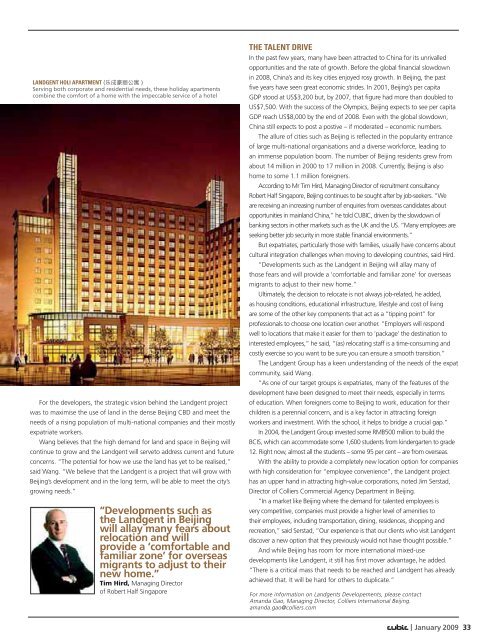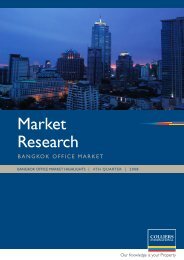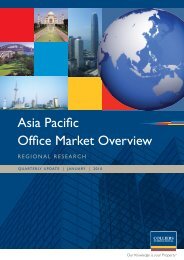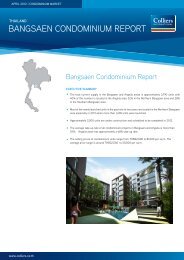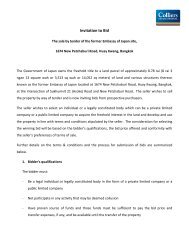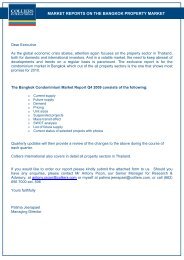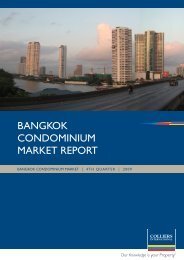CUBIC CoverDec08.indd - Colliers
CUBIC CoverDec08.indd - Colliers
CUBIC CoverDec08.indd - Colliers
Create successful ePaper yourself
Turn your PDF publications into a flip-book with our unique Google optimized e-Paper software.
LANDGENT HOLI APARTMENT ( )<br />
Serving both corporate and residential needs, these holiday apartments<br />
combine the comfort of a home with the impeccable service of a hotel<br />
For the developers, the strategic vision behind the Landgent project<br />
was to maximise the use of land in the dense Beijing CBD and meet the<br />
needs of a rising population of multi-national companies and their mostly<br />
expatriate workers.<br />
Wang believes that the high demand for land and space in Beijing will<br />
continue to grow and the Landgent will serveto address current and future<br />
concerns. “The potential for how we use the land has yet to be realised,”<br />
said Wang. “We believe that the Landgent is a project that will grow with<br />
Beijing’s development and in the long term, will be able to meet the city’s<br />
growing needs.”<br />
“Developments such as<br />
the Landgent in Beijing<br />
will allay many fears about<br />
relocation and will<br />
provide a ‘comfortable and<br />
familiar zone’ for overseas<br />
migrants to adjust to their<br />
new home.”<br />
Tim Hird, Managing Director<br />
of Robert Half Singapore<br />
THE TALENT DRIVE<br />
In the past few years, many have been attracted to China for its unrivalled<br />
opportunities and the rate of growth. Before the global financial slowdown<br />
in 2008, China’s and its key cities enjoyed rosy growth. In Beijing, the past<br />
five years have seen great economic strides. In 2001, Beijing’s per capita<br />
GDP stood at US$3,200 but, by 2007, that figure had more than doubled to<br />
US$7,500. With the success of the Olympics, Beijing expects to see per capita<br />
GDP reach US$8,000 by the end of 2008. Even with the global slowdown,<br />
China still expects to post a postive – if moderated – economic numbers.<br />
The allure of cities such as Beijing is reflected in the popularity entrance<br />
of large multi-national organisations and a diverse workforce, leading to<br />
an immense population boom. The number of Beijing residents grew from<br />
about 14 million in 2000 to 17 million in 2008. Currently, Beijing is also<br />
home to some 1.1 million foreigners.<br />
According to Mr Tim Hird, Managing Director of recruitment consultancy<br />
Robert Half Singapore, Beijing continues to be sought after by job-seekers. “We<br />
are receiving an increasing number of enquiries from overseas candidates about<br />
opportunities in mainland China,” he told <strong>CUBIC</strong>, driven by the slowdown of<br />
banking sectors in other markets such as the UK and the US. “Many employees are<br />
seeking better job security in more stable financial environments.”<br />
But expatriates, particularly those with families, usually have concerns about<br />
cultural integration challenges when moving to developing countries, said Hird.<br />
“Developments such as the Landgent in Beijing will allay many of<br />
those fears and will provide a ‘comfortable and familiar zone’ for overseas<br />
migrants to adjust to their new home.”<br />
Ultimately, the decision to relocate is not always job-related, he added,<br />
as housing conditions, educational infrastructure, lifestyle and cost of living<br />
are some of the other key components that act as a “tipping point” for<br />
professionals to choose one location over another. “Employers will respond<br />
well to locations that make it easier for them to ‘package’ the destination to<br />
interested employees,” he said, “(as) relocating staff is a time-consuming and<br />
costly exercise so you want to be sure you can ensure a smooth transition.”<br />
The Landgent Group has a keen understanding of the needs of the expat<br />
community, said Wang.<br />
“As one of our target groups is expatriates, many of the features of the<br />
development have been designed to meet their needs, especially in terms<br />
of education. When foreigners come to Beijing to work, education for their<br />
children is a perennial concern, and is a key factor in attracting foreign<br />
workers and investment. With the school, it helps to bridge a crucial gap.”<br />
In 2004, the Landgent Group invested some RMB500 million to build the<br />
BCIS, which can accommodate some 1,600 students from kindergarten to grade<br />
12. Right now, almost all the students – some 95 per cent – are from overseas.<br />
With the ability to provide a completely new location option for companies<br />
with high consideration for “employee convenience”, the Landgent project<br />
has an upper hand in attracting high-value corporations, noted Jim Serstad,<br />
Director of <strong>Colliers</strong> Commercial Agency Department in Beijing.<br />
“In a market like Beijing where the demand for talented employees is<br />
very competitive, companies must provide a higher level of amenities to<br />
their employees, including transportation, dining, residences, shopping and<br />
recreation,” said Serstad, “Our experience is that our clients who visit Landgent<br />
discover a new option that they previously would not have thought possible.”<br />
And while Beijing has room for more international mixed-use<br />
developments like Landgent, it still has first mover advantage, he added.<br />
“There is a critical mass that needs to be reached and Landgent has already<br />
achieved that. It will be hard for others to duplicate.”<br />
For more information on Landgents Developements, please contact<br />
Amanda Gao, Managing Director, <strong>Colliers</strong> International Beijing.<br />
amanda.gao@colliers.com<br />
| January 2009<br />
33


